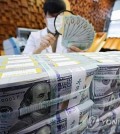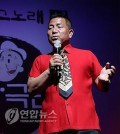- California Assembly OKs highest minimum wage in nation
- S. Korea unveils first graphic cigarette warnings
- US joins with South Korea, Japan in bid to deter North Korea
- LPGA golfer Chun In-gee finally back in action
- S. Korea won’t be top seed in final World Cup qualification round
- US men’s soccer misses 2nd straight Olympics
- US back on track in qualifying with 4-0 win over Guatemala
- High-intensity workout injuries spawn cottage industry
- CDC expands range of Zika mosquitoes into parts of Northeast
- Who knew? ‘The Walking Dead’ is helping families connect
Yoon announces 25 tln-won support package for micro business owners
President Yoon Suk Yeol on Wednesday announced a 25 trillion-won (US$18 billion) package of support measures for struggling micro business owners, saying providing tailored support is better than universal cash handouts.
Yoon unveiled the package during a meeting to discuss the direction of economic policy in the second half, saying micro business owners are still grappling with debts taken to remain afloat during the COVID-19 pandemic era.
“Micro business owners, who were hardest hit by the COVID-19 pandemic, are still in a difficult situation,” Yoon said. “Instead of populist cash handouts, the support plan will provide sufficient, tailored support to small business owners in desperate need and pursue structural measures.”
The remark was also seen as a thinly veiled swipe at the main opposition Democratic Party (DP)’s proposal to provide cash handouts of 250,000 won (US$180) to all citizens to boost domestic spending.
“Why give only 250,000 won per person? Why not 1 billion or 10 billion won each?” Yoon said in a closing remark. “It would make inflation skyrocket and the country’s credit rating collapse, making it impossible for the government and companies to operate abroad.”
Yoon also cautioned against issuing government bonds without consideration of a sound fiscal policy, apparently targeting the DP’s proposal for funding cash handouts.
“(They) recklessly talk about (the government bonds) as if there is no problem as long as credit and debit balance in the balance sheet,” he said.
Yoon said the government will expand low-interest loans to micro business owners and extend the repayment period for policy loans, and provide subsidies for their electricity and rent costs.
The tax benefit for landlords who lower rent for micro business tenants will be extended until the end of 2025, while debt restructuring and support for recovery will be provided for such business owners facing closure.
While recent economic indicators have been on a recovery track, Yoon said it has not yet translated into tangible benefits for the local economy.
South Korea’s economy grew at the fastest pace in over two years in the first quarter, surpassing market expectations. Exports recorded year-on-year gains for the ninth consecutive month in June, driven by robust chip demand, while consumer prices, a key gauge of inflation, remained at around 2 percent for the third consecutive month.
To spur long-term growth, Yoon vowed to remove regulatory hurdles to foster the growth of new industries and take measures to enhance corporate value, which include increased tax benefits to companies that increase dividends and lowering tax rates on dividend income.
South Korea’s economic growth has slowed amid a global economic downturn and weak domestic demand, primarily due to monetary tightening following years of expansionary fiscal spending during the COVID-19 pandemic.
The Bank of Korea has kept its key interest rate at 3.5 percent since January 2023, maintaining it for 10 consecutive decisions. Despite this, the rate remains the highest since 2008.











